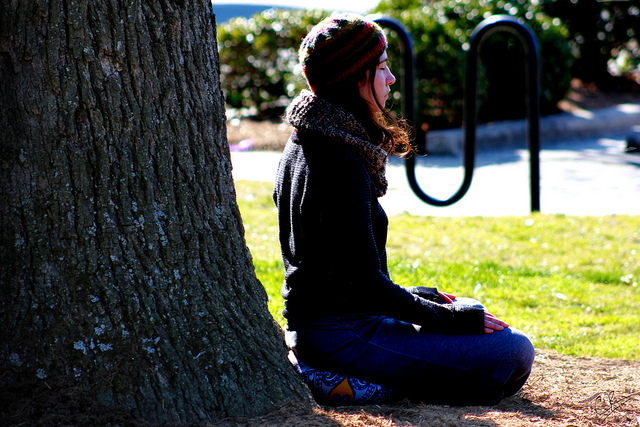In the beginning stages of the healing journey we focus on ourselves—this is absolutely necessary.
Before we can change anything out there, we need to understand what is going on in here.
A bit of self-centeredness is necessary to do the inner work of healing our wounds and shifting the momentum of old habitual patterns that no longer serve us. Until we gain the confidence and skill in taking care of our own heart, we will have a hard time navigating the territory of emotional intimacy.
Having a consistent meditation practice is extremely helpful at this stage.
This daily checking in with our own mind is the foundation of self-awareness.
Over time, the practice of meditation takes us deep into our psyche. Therefore, when we combine it with our work in therapy we are ready for a deep transformation.
We start to appreciate how the very things we want to dismantle actually served a vital purpose at some point in our life. We may have to go all the way to the beginning to pull up the root of those patterns. When approached gently, we begin to see how most of our dysfunctional behavior was at some point also our attempt to feel better. As soon as we can see it this way, we start to soften to the people around us and all of their dysfunctional behavior.
The Buddha taught that before we can extend compassion to others, we have to practice it for ourselves.
As we shed the layers of old patterns and defenses we start to feel our own emotions with more intensity.
Now that we have our mindfulness skills, we don’t need to rely on the old habits of self-protection. We can just breath, feel the energy of the emotions in our body and ground ourselves through our physical senses. These are the ways to simply allow the emotions to come and go.
In fact, one of the definitions of mental health is simply being able to feel all of our feelings. Life happens, we have our emotions in response and then we can move on.
As we begin to appreciate the richness of our inner world, we start realize that there are no bad feelings.
In fact, our emotions are usually trying to tell us something. For example, our anger may be saying that we need to set a boundary, jealousy may be encouraging us to reach for more, worry about scarcity may signal that we’re holding on too tightly.
As a trauma survivor, when fear arises I have to ask myself if there is something here that needs my attention or is this coming from the past? Each of these arisings is another opportunity for growth and self love.
The more we know ourselves and love ourselves, the more we are able to have genuine empathy for other people and all of their difficult feelings.
We can offer expressions of kindness that say, “You’re not alone. I see you. I hear you. I’m right here with you.”
When we accept others just as they are it becomes much easier to connect with them without abandoning ourselves. Compassion is not about being “good.” It is about seeing what’s going on clearly and lovingly. We know we’re all in the same boat and so the people in our life become more endearing.
When we start to realize that our inner work is being reflected in the outer world, everything we meet in our day to day life becomes part of our practice.
My spiritual teacher encourages me to not make any separation between my “spiritual life” and my “worldly life” and to see them as inseparable.
In other words, the spiritual journey is life itself, and the practice is relating with everyone you meet and everything that happens along the way. It’s not about being a “Buddhist,” but rather is about being a kind and gentle human being.
My guiding principles can be summarized in four simple words:
“Create beauty. Share love.”
~
Author: Tina Fossella, MST
Editor: Ashleigh Hitchcock
Photo: Caleb Roenigk/Flickr












Read 0 comments and reply